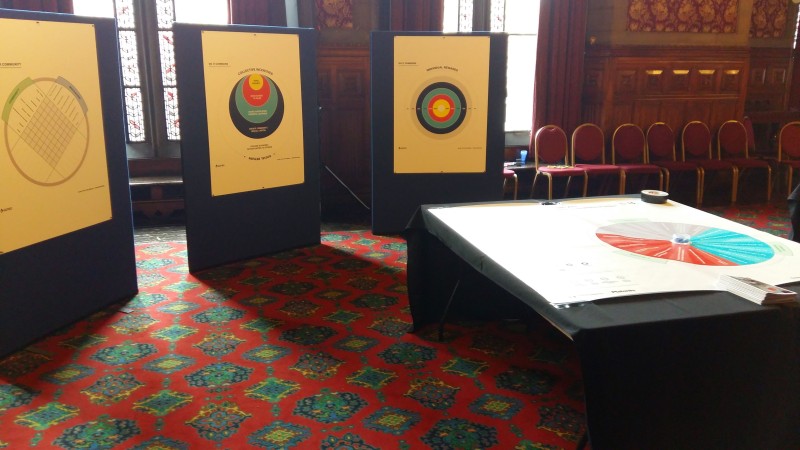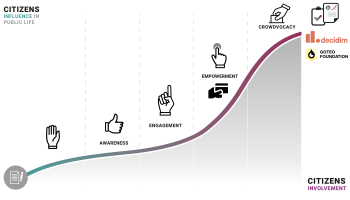
It's hard to imagine giving a Goteo crowdfunding workshop in a setting more elaborate and grand than Manchester's Town Hall, the site of this week's 2015 Future Everything conference. The building, a neo-gothic Victorian completed in 1877, is a maze of antique woodwork, tiled floors, carved ornaments, monumental stained glass windows, tapestries, portraits, a spiral staircase and the magical patina of time. This year for its 20th anniversary, the Future Everything festival had four central themes: “Memory, Ownership, Democracy, and The Weird and the Wonderful”.
Surrounded by the context of Town Hall, each of these themes evoked a link to the past and a bridge to the future, and were part of the event's lectures, installations and performances, as well as casual conversations. Our session Crowdfunding for social good was a nice fit in this event, with so many people interested or involved in creative projects with a focus on social and environmental innovation, education and open culture, and open-source products and processes. That was the main focus of our panel talk at the What Now For… Democracy? session, where we had the opportunity of explaining how civic crowdfunding is reshaping collective participation and transparency in Spain and beyond, as well as Goteo’s unique model for sharing knowledge, code and data:
Our crowdfunding workshop was tailored to suit the nature of the event, taking into account the multiple activities happening at any given time and the tendency for people to wander in and out of rooms, sampling without necessarily staying for long. So, rather than have a typical afternoon-length full workshop, we decided to cycle through three sessions of one hour each, giving a more concentrated explanation of the Goteo crowdfunding philosophy and methodology while still allowing people to actively participate and interact with each other and the material. We chose to be flexible if any participants wanted to stay for a second (or third) session to deepen their understanding. Our goal was to highlight the "crowd" aspect, even in a shorter workshop session, to encourage people to discover the incredible resource of having an involved community around a developing project.
Among the people who came to our workshop were several teams who were attending the conference as part of theApps for Europe or the Europeana Creative app-design challenges (another great session we participated in parallel), and also some people with experience in the non-profit sector, project incubation, fab-labs, design, and other types of development. Some people had a strong personal interest in learning more, and had heard of Goteo before attending the event. Of course, there were also workshop participants who only had a general idea of crowdfunding, and had never before heard of anything like the Goteo model. There were some good debates about the question of ethics and accountability in crowdfunding, and we were happy to point out our transparency commitments and community rewards.
Most people actively participated during each segment of the workshop. Several attendees stayed for more than one segment, to get more personalized explanations and have more time to participate in our exercises, which included reading about and rating past successful projects, includingThe Social Coin,Fold-a-Rap, and Smart Citizen, as a demonstration of how we apply evaluative criteria. We even had one development team volunteer to show their own "app pitch" to experience a taste of the brainstorming process in a community setting. The crowd aspect was present, even in this short, "taster" session, and we got good feedback about our model and method both during the workshop and after. We are grateful and delighted to have been part of such a richly varied event in a beautiful, unusual venue.





 Joan B. Cabot
Joan B. Cabot 
 Olivier
Olivier 